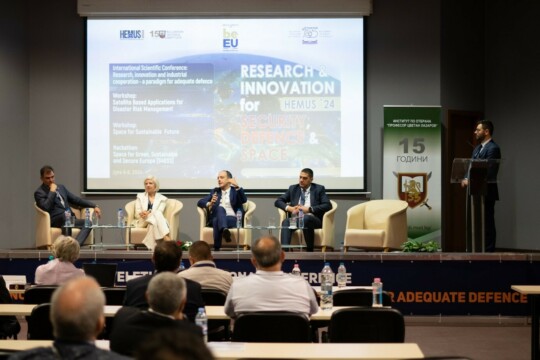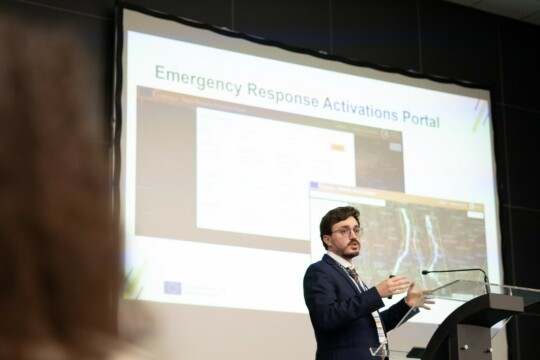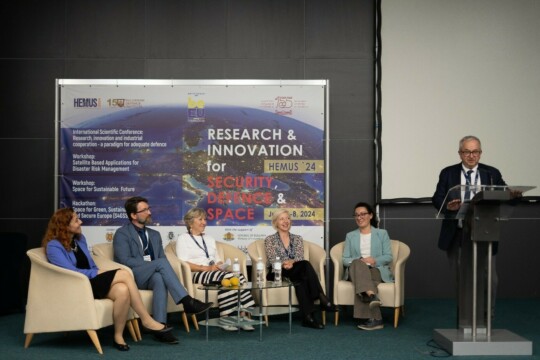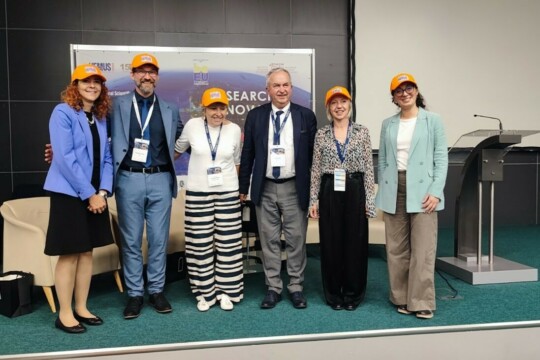3 Workshops and a Hackathon: Eurisy at HEMUS 2024 showcasing space for safety and sustainability in Plovdiv, Bulgaria

HEMUS 2024: Research and Innovation for Security, Defence and Space, the largest annual defence exhibition in the Balkans, took place this year within two main contexts. On the one hand, geopolitical relations trend toward tension, and climate change continues to exert a growing toll on societies, culminating in new and increasing risks to society. On the other hand, a growing national technological sector stimulated by national and international initiatives has built the foundations of a range of capabilities ready to provide safety and security to Bulgaria, and the wider EU. Gathered in Plovdiv, Bulgaria, a city with nearly 3,000 years of history still on display among its streets, a range of stakeholders, from policy experts, armed forces, space companies, and user communities, discussed how to ensure a safe and resilient future for the rapidly modernising country. Within these contexts, Eurisy supported three side events during HEMSUS 2024, “Space for Security and Defence”, “Satellite-based Services for Disaster Risk Management”, and “Space for Sustainable Future”.
“Space for Security and Defence”

Rodrigo da Costa, Executive Director of EUSPA, speaks during the Space for Security and Defence panel. Photo provided by RST-TTO
The “Space for Security and Defence” event, inaugurated by Bulgarian Defence Minister Atanas Zapraianov, emphasized the importance of enhancing connections between Bulgaria’s scientific and industrial sectors through national and European initiatives amidst a challenging geopolitical landscape. Collaborating with the Belgian EU Council presidency, Belgian Ambassador Frédéric Meurice highlighted Belgium’s legislative achievements. At the same time, Honorary Senator Dominique Tilmans stressed the need for policy-technology integration, especially regarding satellite data for climate change and security. Stefan Hadjitodorov and Kamen Iliev from the Bulgarian Academy of Sciences underscored Bulgaria’s historical achievements in space. They advocated for continued inter-ministerial cooperation, new funding, and nurturing young talent to bolster Bulgaria’s role in international institutions like ESA and EUSPA.
“Satellite-based Services for Disaster Risk Management”

Gabriel Lazazzara, Senior Consultant, EU Space Support Office presents the Copernicus Emergency Management Service (CEMS). Photo provided by RST-TTO
The Bulgarian edition of theworkshop series co-organised by EUSPA and Eurisy brought together a range of local service providers alongside user communities and European policy experts. Participants discussed how satellite technologies, including the components of the EU Space Programme, could most effectively contribute to national disaster risk management efforts. A range of end-user community representatives discussed their implementation of satellite-based technologies for disaster risk management efforts, including those related to sustainable urban development and climate adaptation in Plovdiv. Among the companies presenting were Bianor. KONTRAX, and TAKT-IKI, the latter of which are working on several projects related to disaster risk management and climate adaption, such as MED-IREN (MEDiterranean critical Infrastructure Resilience Engineering with Nature-based solutions) and Valorada. The workshop also marked the first official visit of Rodrigo da Costa, Executive Director of EUSPA, to Bulgaria, representing the increasing presence of EUSPA in Bulgaria, with new EGNOS capabilities coming to Sofia Airport, and services enabled by the EU Space Programme gaining increasing uptake in the country.
“Space for Sustainable Future”

Kamen Iliev, Director, Centre for National Security and Defence Research speaks during the Space for Sustainable Future panel. Photo provided by RST-TTO
Finally, on the 7th June, the Space for Sustainable Future workshop highlighted the role of the ESA Accelerators each created to support accelerating the use of space to address three major societal challenges:
- Rapid and Resilience Crisis Response,
- Space for Green Future,
- Protection of Space Assets.
At the heart of the Accelerators initiative, as presented by Christopher Topping, Rapid & Resilient Crisis Response Accelerator Lead at ESA, is the need to connect with new non-space users and support the development of accessible, affordable, and innovative space-based technologies, fostering local space ecosystems and accelerating the use of space throughout society. The workshop, also featuring presentations from national service providers, provided the inspiration for the hackathon “Space For Green, Sustainable and Secure Europe (S4GSS)”. Featuring 8 teams of students, researchers, and WHO ELSE, teams had two days to develop their ideas using space technologies for sustainability for a panel of expert judges. Through a closely contested battle, a winner emerged, team Aurora from the Technical University of Sofia with their idea of providing rapid situational awareness for decision-makers to speed up the coordination of assistance during earthquakes.

From left to right: Christina Giannopapa (EUSPA), Christopher Topping (ESA), Dominique Tilmans (Eurisy), Kamen Iliev (RST-TTO), Dinka Dinkova (DG DEFIS), Annalisa Donati (Eurisy)
Thanks to events such as these, Eurisy can connect with new user communities and stakeholders, demonstrating the possibilities of space in addressing the key societal challenges. With seven Disaster Risk Management workshops conducted across the EU, it is becoming increasingly clear that such events can play an important role in showcasing satellite-based services across the disaster risk management cycle and making decision-makers and authorities aware of the many benefits, but also the challenges that must be overcome, when implementing satellite technologies in keeping societies safe.
